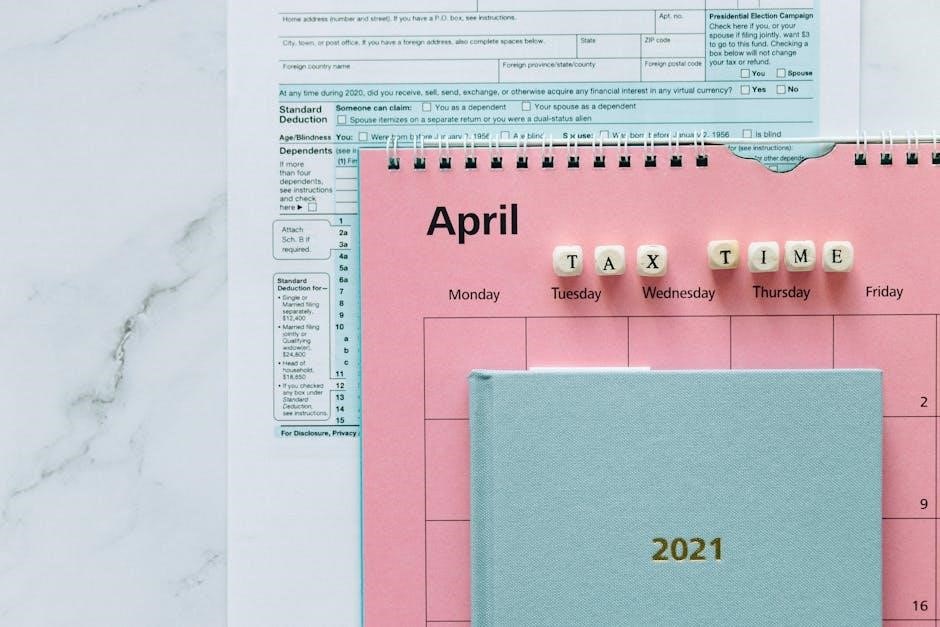The NJ Inheritance Waiver Tax Form 0-1 is a legal document required to transfer assets from a decedent’s name to beneficiaries, ensuring compliance with tax regulations.
Overview of the NJ Inheritance Waiver Tax Form 01
The NJ Inheritance Waiver Tax Form 0-1 is a critical document used to obtain approval from the New Jersey Division of Taxation for transferring or releasing certain assets of a decedent. It ensures compliance with state tax regulations and facilitates the legal transfer of property to beneficiaries. This form is required for assets such as real estate, funds in financial institutions, or brokerage accounts. It streamlines the process of transferring ownership without unnecessary delays, making it essential for executors and beneficiaries to understand its role in estate settlement.
Importance of the Form in Asset Transfer
The NJ Inheritance Waiver Tax Form 0-1 plays a pivotal role in facilitating the seamless transfer of assets from a decedent to beneficiaries. It ensures compliance with New Jersey tax laws, preventing legal complications and delays. By obtaining this waiver, executors can efficiently manage estate distributions, avoiding potential disputes or additional taxes. The form is essential for transferring real property, financial assets, and other holdings, making it a cornerstone of the estate settlement process in New Jersey.

Understanding Form 0-1
The NJ Inheritance Waiver Tax Form 0-1 is a legal document required to transfer assets from a decedent’s name to beneficiaries, ensuring compliance with tax regulations.
Definition and Purpose of Form 0-1
Form 0-1 is a legal document issued by the New Jersey Division of Taxation, representing a waiver to transfer or release certain assets from a decedent’s name. Its primary purpose is to obtain consent for asset distribution to beneficiaries, ensuring compliance with state tax regulations. This form is essential for settling estates and transferring property, such as real estate, funds, or securities, to heirs. It simplifies the process of releasing assets while addressing any applicable tax obligations.
Structure and Components of the Form
Form 0-1 consists of multiple sections designed to facilitate the legal transfer of assets. It includes beneficiary classification, asset listing, and tax details. The form requires information about the decedent, beneficiaries, and specific assets such as real estate, funds, or securities. It also includes sections for tax obligations and exemptions. Documentation like death certificates and proof of beneficiary status may be required. The form must be signed by the executor or beneficiary to validate the transfer process and ensure compliance with state tax regulations.

Eligibility Criteria
Eligibility for Form 0-1 requires beneficiaries to meet specific conditions, such as being Class A beneficiaries or falling under exemption categories. Assets must not require a tax return filing, and all tax obligations must be settled prior to submission. Certain exceptions apply for specific asset types or beneficiary statuses, as outlined by New Jersey tax regulations.
Who Qualifies to Use Form 0-1?
Form 0-1 is primarily for Class A beneficiaries, such as spouses, children, parents, or grandparents of the decedent. It is also applicable for certain exempt entities, like charities or trusts, under specific conditions. The form is required for transferring assets like real property or funds held in New Jersey financial institutions. Beneficiaries must ensure all tax obligations are satisfied, and the estate does not require a full tax return filing. This form simplifies the asset transfer process for eligible parties.
Conditions for Form Submission
Submission of Form 0-1 requires that all applicable taxes are paid or properly secured. Beneficiaries must be Class A, and the decedent’s estate must not necessitate a full inheritance or estate tax return. Assets eligible for transfer include New Jersey real property, funds in financial institutions, and brokerage accounts. Documentation, such as proof of beneficiary status and tax clearance, must accompany the form. Exceptions may apply for certain trusts or charitable organizations, but all conditions must be met for approval.
Special Cases and Exceptions
Special cases may allow for exceptions to standard Form 0-1 submission requirements. For instance, if all beneficiaries are Class A and no inheritance or estate tax is due, the form may be used without additional documentation. However, it cannot be used for non-Class A beneficiaries or when taxes remain unpaid. Certain trusts or charitable organizations may also qualify for exceptions, provided specific conditions are met. This form simplifies asset transfers in eligible cases, avoiding the need for a full tax return filing.

Obtaining and Completing the Form
The NJ Inheritance Waiver Tax Form 0-1 can be obtained from the New Jersey Division of Taxation website. Ensure accurate completion by filling in the decedent’s details, beneficiary information, and listing all relevant assets. Proper documentation and adherence to instructions are crucial for a smooth submission process and approval.
Where to Obtain Form 0-1
The NJ Inheritance Waiver Tax Form 0-1 can be obtained directly from the New Jersey Division of Taxation website. It is also available for download as a PDF from trusted legal document platforms. Additionally, it can be accessed through the official state government portal or by visiting a local tax office. Ensure the form is downloaded from a secure and official source to avoid any discrepancies or unauthorized modifications. Always verify the form’s authenticity before use.
Step-by-Step Guide to Completing the Form
To complete the NJ Inheritance Waiver Tax Form 0-1, start by downloading it from the official New Jersey Division of Taxation website. Fill in the decedent’s personal details and list all assets to be transferred. Ensure accurate information about beneficiaries, including their relationships and shares. Sign the form and have it notarized if required. Attach necessary documentation, such as tax receipts or death certificates. Submit the form to the NJ Division of Taxation for approval. Verify all details before submission to avoid delays.
Required Documentation for Submission
When submitting Form 0-1, you must include specific documentation to ensure compliance. Attach a certified copy of the decedent’s death certificate, proof of tax payments, and a detailed inventory of assets. Include beneficiary identification, such as Social Security numbers, and any applicable appraisals for real estate or other valuable items. A cover sheet, available on the NJ Division of Taxation website, must also be completed. These documents verify the transfer’s legitimacy and ensure proper processing of the waiver request.
Submission Process and Requirements
To submit Form 0-1, ensure all tax obligations are met and required payments are made. Attach the completed form to the cover sheet and mail or hand-deliver it to the NJ Division of Taxation. Processing typically takes 4-6 weeks. Ensure all beneficiary information and asset details are accurate. A waiver cannot be granted until all taxes are paid or provided for. Follow instructions carefully to avoid delays and ensure proper transfer of assets.

Tax Implications
The NJ Inheritance Waiver Tax Form 0-1 impacts New Jersey inheritance and estate taxes, ensuring compliance and proper tax payment before asset transfer, avoiding additional liabilities.
Impact on New Jersey Inheritance Tax
The NJ Inheritance Waiver Tax Form 0-1 significantly influences the New Jersey Inheritance Tax by ensuring that all applicable taxes are paid before asset distribution. This form mandates that any inheritance tax due must be settled prior to the transfer of assets, preventing tax evasion or underreporting. It helps in accurately assessing tax liability based on the beneficiary’s relationship to the deceased, applying the correct tax rates. Non-compliance with this form can lead to penalties or delays in asset transfer, emphasizing its crucial role in maintaining tax integrity and compliance;
Effect on New Jersey Estate Tax
The NJ Inheritance Waiver Tax Form 0-1 plays a critical role in determining the New Jersey Estate Tax liability. For deaths occurring on or after January 1, 2018, New Jersey no longer imposes an Estate Tax, simplifying the process. However, for pre-2018 cases, the form ensures that estate taxes are properly addressed and paid before assets are transferred. This compliance measure guarantees that all tax obligations are met, avoiding delays or penalties in asset distribution. The form’s submission is essential for finalizing estate settlements.
Other Tax Considerations and Considerations
The NJ Inheritance Waiver Tax Form 0-1 also impacts federal estate taxes for larger estates. While New Jersey eliminated its Estate Tax for deaths after January 1, 2018, federal taxes may still apply. Beneficiaries must ensure compliance with all tax regulations, including those for real estate and financial accounts held in New Jersey. The form simplifies asset transfer for Class A beneficiaries when no inheritance or estate tax is due, avoiding unnecessary delays in the probate process and ensuring a smooth distribution of assets. Proper documentation remains crucial.

Common Mistakes to Avoid
Common errors include incomplete form sections, incorrect beneficiary information, and missing required documentation. Ensure all details are accurate and properly signed to avoid processing delays.
Typical Errors in Form Completion
Common mistakes include incomplete or inaccurate beneficiary information, missing signatures, and failure to attach required documentation. Errors in listing asset details or incorrect tax calculations can delay processing. Ensuring all sections are filled out correctly and submitting proper supporting documents is essential to avoid rejection. Using outdated form versions or omitting required information can also lead to issues. Double-checking entries and consulting with a tax professional if unsure can help prevent these errors and ensure smooth form submission.
Consequences of Inaccurate Submissions
Inaccurate submissions of Form 0-1 can result in processing delays, penalties, or even asset freezes. Errors may trigger additional scrutiny, potentially leading to audits or legal complications. Beneficiaries could face extended wait times for asset transfers, and executors may incur financial penalties for non-compliance. Incomplete or incorrect filings can also lead to contested claims or disputes among parties. Ensuring accuracy is crucial to avoid these consequences and facilitate a smooth asset transfer process under New Jersey tax regulations.

Role of Beneficiaries and Executors
Executors are responsible for submitting Form 0-1 to transfer assets, while beneficiaries must ensure information accuracy and sign the form for tax compliance.
Responsibilities of Beneficiaries
Beneficiaries must ensure all information provided on Form 0-1 is accurate and complete. They are required to sign the form, acknowledging receipt of assets and compliance with tax regulations. Beneficiaries should also verify the eligibility of assets for transfer and maintain documentation supporting their claims. Failure to meet these responsibilities may delay asset distribution or result in legal consequences.
Duties of the Executor in Form Submission
The executor is responsible for preparing and submitting Form 0-1 to the New Jersey Division of Taxation. They must gather all necessary documentation, such as waivers and tax clearances, and ensure the form is completed accurately; The executor must also verify that all taxes owed are paid before assets can be transferred. They are legally obligated to ensure compliance with state tax regulations and may be held liable for any errors or omissions in the submission process.

Role in Estate Planning
Form 0-1 plays a crucial role in estate planning by facilitating the smooth transfer of assets and ensuring tax compliance, helping executors and beneficiaries avoid probate delays and legal complexities.
Significance of Form 0-1 in Estate Planning
Form 0-1 is essential in estate planning as it enables the legal transfer of assets from a decedent to beneficiaries, ensuring tax compliance and avoiding probate delays. By obtaining this waiver, executors can efficiently manage estate distributions, reducing legal complexities. It streamlines the process of releasing property, such as real estate and financial assets, while adhering to New Jersey’s tax regulations. This form is vital for ensuring that the decedent’s wishes are carried out smoothly and lawfully, protecting both executors and beneficiaries from potential disputes or penalties.

Frequently Asked Questions
What is the NJ Inheritance Waiver Tax Form 01 used for? It is required to transfer assets from a decedent to beneficiaries, ensuring tax compliance and proper distribution.
Common Queries About Form 0-1
What is Form 0-1 used for? It is required to transfer assets from a decedent to beneficiaries, ensuring compliance with New Jersey inheritance tax laws. Who needs to file it? Beneficiaries or executors of the estate. What documents are required? Proof of death, asset details, and tax clearance. What happens if it’s incomplete? Delays or penalties may occur. Can it be filed online? Yes, through official state portals. Where to find the form? On the New Jersey Division of Taxation website or local offices.
The NJ Inheritance Waiver Tax Form 0-1 is a critical document for transferring assets from a decedent to beneficiaries, ensuring compliance with New Jersey tax laws. It simplifies the process by providing written consent from tax authorities, avoiding delays or legal complications. Proper completion and submission are essential to facilitate smooth asset distribution. Consulting professionals can help navigate the process effectively, ensuring all requirements are met and taxes are properly addressed. This form plays a vital role in estate settlement, protecting both executors and beneficiaries from potential disputes or penalties.